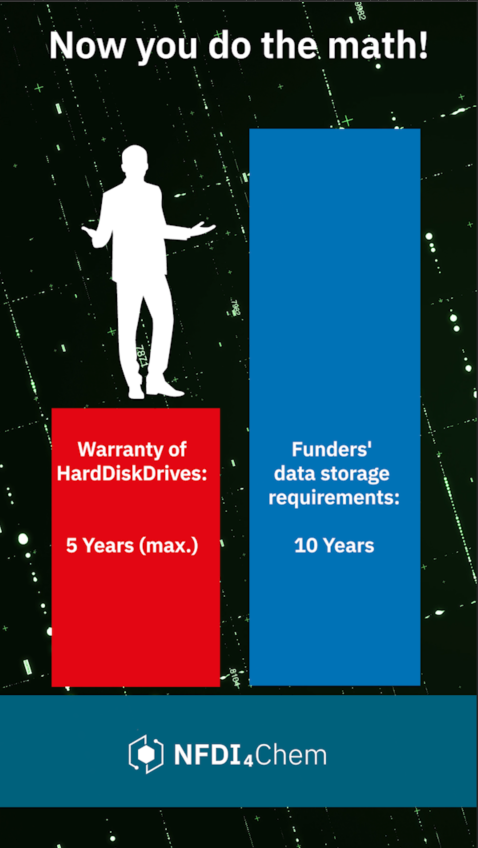Did you know? Hard disks have a maximum warranty of 5 years. But the DFG requires 10 years for data storage.

Do the math: that can’t work. So if you rely only on your PC hard drive, you’ll soon end up in trouble. Yet in our recent survey of chemists, 69% (down from 75% in 2019) still said they use personal or shared computers for long-term data storage.
In today’s digital world, safe data storage is indispensable because data is the digital currency of today’s professional world. There are numerous reasons why you should not solely rely on hard disks or similar storage media:
- Hard disk defects are one of the most common causes of data loss. Every hard disk has a limited lifespan, even high-quality drives can suddenly fail due to overheating, software errors, partition errors. And even the warranty will only get you a new disk, but not return your lost data.
- USB flash drives may seem convenient, but they are small, easily misplaced, and prone to physical damage. If you store important files only on a USB stick and it gets lost or damaged, your data will be irretrievably lost.
- Cloud solutions are undoubtedly convenient and offer the advantage of remote access to your data. Nevertheless, cloud providers can suffer security breaches that lead to data leaks. In addition, there is the risk that the provider could discontinue its service.
This can have a disastrous impact on your research work or funding.
And the solution?
A well-thought-out data strategy can ensure that your data is safe even when your hard drive gives up the ghost.
The best way to do this is to create a thoroughly thought out data management plan (DMP). You can find all the important info about it here: Data Management Plan.
If you need assistance, sign up for our Research Data Management Basic Workshop.
During research
During the research phase, you need robust data storage. To do this, create backups on different storage media to ensure that your data is backed up in multiple locations.
The 3-2-1 rule is best: 3 copies on 2 different storage media with 1 backup to an off-site location.
After research
After the research or publication is complete, you need a sound strategy for providing the data for publication and ensuring its archiving in line with funder requirements. You solve these demands by storing them in a repository. Info about this can be found here.
By the way, this is a good opportunity to store data in a FAIR way. FAIR? FAIR.
Remember: it’s not a question of if data loss will occur, but when.
Be prepared.